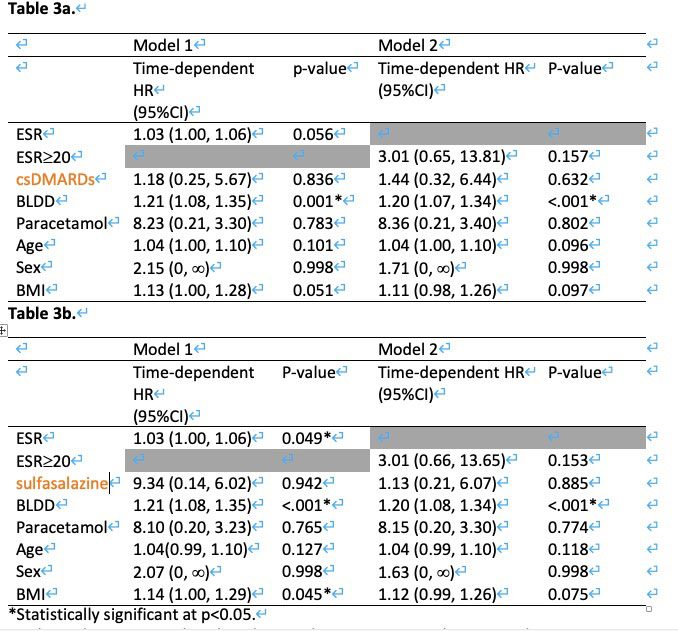Session Information
Date: Saturday, November 12, 2022
Title: Spondyloarthritis Including PsA – Diagnosis, Manifestations, and Outcomes Poster I
Session Type: Poster Session A
Session Time: 1:00PM-3:00PM
Background/Purpose: In the general population, hypertension (HT) is reported as one of the most important risk and modifiable factors to develop CVD. It is well recognized that inflammatory rheumatic diseases had increased risk of cardiovascular disease (CVD) burden. But limited studies exploring the relationship between axial spondyloarthritis (axSpA) and hypertension (HT) were reported.
Methods: This is a retrospective cohort study performed in axSpA patients who were recruited from 2001-2019 in the rheumatology clinic of PWH. Patients with established HT diagnosis and/or anti-hypertensives at baseline were excluded. They were followed from 2001 to 2020, till the occurrence of first diagnosis of IHT or end of study or the loss of follow-up. Baseline clinical and demographic data, drug history and traditional CV risk factors were compared between groups with and without IHT. Baseline and time-varying Cox regression analyses adjusting for age, sex, and BMI, were used to assess the relationship between drug history, inflammatory burden and IHT.
Results: 413 patients [34(25-43) years, male: 319 (77.2%)] were recruited. After a median follow up of 12 (6-17) years, 58 patients (14%) developed IHT (IHT+group). At baseline, in the multivariable Cox regression model, only baseline disease duration was an independent predictor for IHT. In the time-varying univariable Cox regression, increased ESR level and high inflammatory state (ESR≧20) over time were significant predictors for the development of IHT. Regarding drug use, paracetamol as well as use of csDMARDs, especially sulfasalazine were significantly associated with a higher risk of developing IHT (p< 0.001). While in multivariate analysis, baseline disease duration remained as the only significant predictor to increase risk of future IHT. ESR as an inflammatory marker had only borderline statistical significance in predicting the development of IHT, while ESR³20, the use of csDMARDs or sulfasalazine or paracetamol were no longer statistically significant.
Conclusion: Higher inflammatory burden as reflected by a longer baseline disease duration was a predictor associated with IHT after adjusting for traditional CV risk factors. Higher ESR level may also play a role in the development of IHT in these patients.
To cite this abstract in AMA style:
Shi J, Lam S, So H, Li E, Li T, Szeto C, Tam L. Inflammation Is Associated with Incident Hypertension in Patients with Axial Spondyloarthritis: A Longitudinal Cohort Study [abstract]. Arthritis Rheumatol. 2022; 74 (suppl 9). https://acrabstracts.org/abstract/inflammation-is-associated-with-incident-hypertension-in-patients-with-axial-spondyloarthritis-a-longitudinal-cohort-study/. Accessed .« Back to ACR Convergence 2022
ACR Meeting Abstracts - https://acrabstracts.org/abstract/inflammation-is-associated-with-incident-hypertension-in-patients-with-axial-spondyloarthritis-a-longitudinal-cohort-study/



